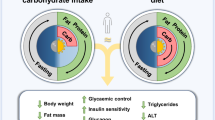Abstract
Objectives: Bedtime carbohydrate (CHO) intake in patients with type‐2 diabetes may improve glucose tolerance at breakfast the next morning. We examined the ‘overnight second‐meal effect’ of bedtime supplements containing ‘rapid’ or ‘slow’ CHOs.
Design: Randomized cross‐over study with three test‐periods, each consisting of two days on a standardized diet, followed by a breakfast tolerance test on the third morning.
Setting: The Lundberg Laboratory for Diabetes Research, Sahlgrenska University Hospital, Göteborg, Sweden.
Subjects: Sixteen patients with type 2 diabetes on oral agents and/or diet.
Interventions: Two different bedtime (22.00 h) CHO supplements (0.46 g available CHO/kg body weight) were compared to a starch‐free placebo (‘normal’ food regimen). The CHOs were provided as uncooked cornstarch (slow‐release CHOs) or white bread (rapid CHOs).
Results: On the mornings after different bedtime meals we found similar fasting glucose, insulin, free fatty acid and lactate levels. However, the glycaemic response after breakfast was 21% less after uncooked cornstarch compared to placebo ingestion at bedtime (406±46 vs 511±61 mmol min 1−1, P<0.01). In contrast, it did not differ when the evening meal consisted of white bread (451±57 mmol min 1−1) compared to placebo. According to an in vitro analysis, uncooked cornstarch contained ∼4 times more slowly digestible starch as compared to white bread.
Conclusions: A bedtime meal providing uncooked cornstarch improved breakfast tolerance the next morning while, in contrast, this was not found following a bedtime meal of white bread. The results are consistent, therefore, with the concept that an increased intake of slowly digestible carbohydrates exert an overnight second‐meal effect in patients with type 2 diabetes.
Sponsorship: This study was supported by grants from the Swedish Medical Research Council (project 3506) and the Ingabritt and Arne Lundberg Foundation.
Similar content being viewed by others
Author information
Authors and Affiliations
Contributions
Contributors: MA: conception and design; provision of study materials and patients; administrative, technical, and logistic support; collection and assembly of data; analysis and interpretation of data; statistics; drafting of the article; critical revision of the article for important intellectual content. RAL: Conception and design; administrative, technical, and logistic support; critical revision of the article for important intellectual content. PL: conception and design; critical revision of the article for important intellectual content. US: Conception and design; administrative, technical, and logistic support; analysis and interpretation of data; statistics; drafting of the article; critical revision of the article for important intellectual content; obtaining of funding.
Guarantor: M Axelsen and U Smith.
Rights and permissions
About this article
Cite this article
Axelsen, M., Arvidsson Lenner, R., Lönnroth, P. et al. Breakfast glycaemic response in patients with type 2 diabetes: Effects of bedtime dietary carbohydrates. Eur J Clin Nutr 53, 706–710 (1999). https://doi.org/10.1038/sj.ejcn.1600837
Received:
Revised:
Accepted:
Published:
Issue Date:
DOI: https://doi.org/10.1038/sj.ejcn.1600837
- Springer Nature Limited
Keywords
This article is cited by
-
Influence of the glycaemic index of an evening meal on substrate oxidation following breakfast and during exercise the next day in healthy women
European Journal of Clinical Nutrition (2008)
-
Glycemic index in chronic disease: a review
European Journal of Clinical Nutrition (2002)




